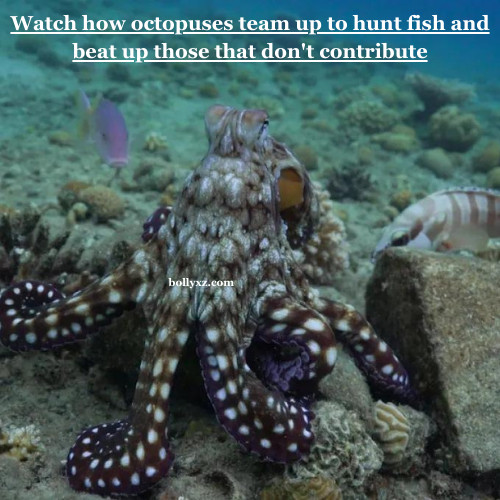In the waters of the Red Sea, fish and octopuses are forming an alliance that isn’t working: They’re joining forces to track down their prey, setting up a hunting operation that’s likely to be more effective than if each creature worked alone.
With the octopus in the lead, the fish look for hidden prey and point out where to catch a smaller fish or mollusk. But if freeloading fish are nearby, trying to enjoy the hunt without contributing, the octopus will chase them away with its fists, according to a new study.
Octopuses team up to hunt fish
“The octopus functions as the decision-maker in the organization,” Eduardo Sampaio, a researcher at the Max Planck Institute for Animal Behavior and lead author of the study, tells Nature News’ Helena Kudiabor.
The study, published Monday in Nature Ecology & Evolution, brought a new type of collective behavior to light. Octopuses, generally considered solitary animals, preyed on a wide variety of fish and recognized those useful to them and those not.
Study co-author Iain Couzin, an evolutionary biologist and director of Max Planck, found that octopuses have an extremely developed social lifestyle with other octopuses and other species. Institute for Animal Behavior, tells Lauren Leffer of the prestigious technology magazine.
Sampaio and his team collected about 120 hours of underwater photography during dives in the Red Sea. They filmed 13 scenes showing a large blue octopus (Octopus cyanea) hunting with different species of fish. And the different animals seemed to have different roles in the operation.
Sampaio explains to Vice’s Mirjam Guesgen that fish serve as a wide-ranging sensory system for the octopus. The octopus can study and observe its environment precisely through observation.
One of the octopus’ biggest helpers was a species of fish called the blue goatfish (Parupeneus cyclostomus), which had strong group hunting skills. It could explore new crevices and show the octopus where to find prey with the help of hovering over the surroundings or moving from one crevice to another and back again.
“If the group moves, everyone is happy. It’s the same thing,” Sampaio tells National Geographic’s Melissa Hobson. Occasionally, other species of fish (most often blacktip groupers (Epinephelus fasciatus)) weren’t as helpful and seemed to be waiting for others to do the work. In those cases, they got a jab from the octopus.
But it wasn’t just the octopuses that became controlling members of the group: Some fish also displaced others by quickly approaching them. The fish didn’t show any aggressive movements toward the octopus, according to the article, suggesting that the cephalopod became the dominant character. The octopus tried to determine whether the group could move to a new region.
As the hunting group identifies prey hidden beneath a rock, the octopus wraps its body around the stone, trapping the animal. This is a common hunting behavior for the big blue octopus, but because it pursues prey alongside fish, the cephalopod performs this wrapping action fewer times, the team found, likely saving energy.
By gaining deeper insights into the animals’ collective movements, researchers can help conserve other species, Marina Papadopoulou, a computational biologist at Swansea University in Wales who was not involved in the study, tells The New York Times’s Elizabeth Preston.
Still, the videos couldn’t capture whether the hunting group members remained the same. For future studies, Sampaio and her group need to decide whether the animals prey on each other, as this could add even more nuance and complexity to the interaction. “Does this octopus like to hunt mullet regularly, or does it want to hunt with Martha, who is a great hunter, and not with Steve, who is a slacker?” he tells Popular Science.
The researchers have another gap they’ve been trying to fill: It’s hard to determine how much benefit each species gets, or, more especially, who is ingesting the prey. The octopus gets the most benefit, they hypothesize, compared to hunting alone. Some fish manage to catch prey if they elude the octopus, according to the New York Times, but they’re not sure whether all fish get equal amounts.
For other scientists, like Hannah MacGregor, a researcher of marine animal behavior at the University of Cambridge in England, the work is already “surely fascinating,” she tells Nature News, and allows researchers to better understand “what would drive, in this case, completely different groups of species to come together.”

